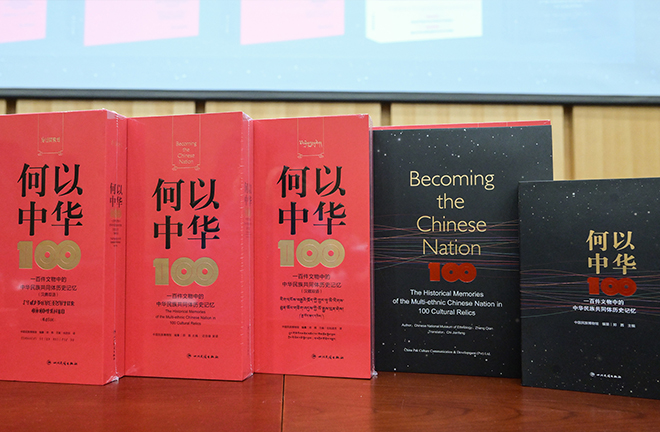Top 10 academic focuses of 2023 unveiled

Multilingual editions of Becoming the Chinese Nation: The Historical Memories of the Multi-ethnic Chinese Nation in 100 Cultural Relics, which were launched on Jan. 12, 2024 Photo: XINHUA
On Dec. 29, 2023, the Information Center for Social Sciences at Renmin University of China (RUC), together with other institutions, released a list of the top 10 academic focal points of philosophy and the social sciences in China in 2023.
The top 10 trends in Chinese academia include: Xi Jinping Thought on Culture studies; the construction of an independent Chinese knowledge system; the contemporary value and practical path of the Global Development Initiative (GDI), Global Security Initiative (GSI), and Global Civilization Initiative (GCI); multidimensional research on the history of exchanges, communication, and integration among ethnic groups of the Chinese nation; new developments in the organization of unearthed documents and studies of literature from the pre-Qin era (prior to 221 BCE), as well as the Qin (221–207 BCE) and Han (206 BCE–220 CE) dynasties; ethical examination of emerging technologies; financial supply-side structural reform and modern financial regulation; the construction of a legal system for data rights confirmation and authorization; digital geopolitics and new forms of international communication; and generative artificial intelligence and changes in the knowledge production paradigm.
Developing Chinese theories
In 2023, Xi Jinping Thought on Culture became an important research topic for theorists. To deepen studies of the thought, Yang Geng, former vice president of Beijing Normal University, called for further studies on such fields as integrating the basic tenets of Marxism with China’s specific realities and fine traditional culture, and the relationship between fine traditional Chinese culture and the common values of humanity.
Regarding the construction of an independent Chinese knowledge system, Hao Lixin, a professor of Marxism at RUC, proposed understanding the basic principles, scientific methods, and practical pathways of the undertaking within the holistic linkage between Chinese culture and socioeconomic development, and organically blending with the development of systems for fields of study, academia, and discourse in philosophy and the social sciences.
The GDI, GSI, and GCI represent Chinese solutions to problems facing the contemporary world and humanity. Zhang Ji, deputy dean of the School of International Relations and Public Affairs at Fudan University, suggested deepening basic theoretical research on development, security, and civilizational issues to promote mutual learning and reciprocal development between the independent Chinese knowledge system and outstanding achievements of human civilization.
Advancing interdisciplinary research
In 2023, research on the history of exchanges, communication, and integration among ethnic groups of the Chinese nation was expanded across multiple dimensions. Peng Yong, dean of the School of History and Culture at Minzu University of China, pointed out the strong interdisciplinary nature of this field, characterized by extensive and profound research content, as well as innovative approaches. He highlighted the necessity to continuously build independent systems for historical materials, discourse, and theory regarding the community for the Chinese nation.
The unearthing of substantial volumes of new documents in recent years has significantly expanded the research scope for the literature and history community. Liu Yuejin, a Member of the Chinese Academy of Social Sciences, urged in-depth multidisciplinary cooperation, dialogues on Chinese characters, texts, and civilization, and classification and deeper research of ancient literary documents to enter the historical scenes and textual contexts during the emergence of early literature.
In 2023, academia also directed its attention to the ethical implications of technological innovation for society, individuals, and the environment. Confronting the continuous iteration and advancement of technology, Liu Dachun, a professor of philosophy from RUC, underscored the importance of assessing the potential long-term effects of emerging technologies on society, the economy, and the environment through a more effective mechanism. He also advocated for increased public participation and enhanced cooperation among countries, industries, and disciplines to jointly cope with global ethical challenges.
Providing theoretical backing
With regard to financial supply-side structural reform and modern financial regulation, Liang Qi, deputy Party secretary of Nankai University, noted that future studies will focus on the underlying logic of how innovative financial development bolsters Chinese modernization, and on deepening supply-side structural reform in the financial sector, strengthening the resilience of the financial system, optimizing financial regulation, coordinating financial innovation and security, and accelerating the building of a financial powerhouse.
Legal experts have conducted extensive research on changes to rights, obligations, and responsibilities brought about by data circulation, but a consensus has yet to be reached concerning the nature of data property and institutional arrangements. Wang Liming, a professor of law at RUC, stressed closely observing trading practices in the data factor market and enhancing the feasibility of data classification and staging standards to ensure that different classes and stages of data are circulated and traded under secure and compliant conditions.
Changes in the international communication landscape and the transformation of order invited by digital geopolitics have also drawn much attention. Jing Xuemin, a professor from the Institute of Political Communication at the Communication University of China, noted that information carries profound economic, political, technological, and military implications. He emphasized that scholars should not only focus on the superficial aspects of information in geopolitics, but should also dig deep to reveal its underlying connotations and nature.
In 2023, academics also discussed the knowledge production and communication mechanism in the intelligent era alongside resultant changes in the conception of knowledge and epistemology. According to Gao Qiqi, a professor from the Institute of Political Science at East China University of Political Science and Law, theoretical research on generative artificial intelligence should be expanded in depth, and a series of new large models should be leveraged, such as deep neural networks and computing texts, in order to translate early exploratory outcomes into empirical results.
Edited by CHEN MIRONG
